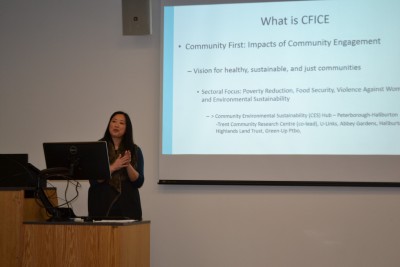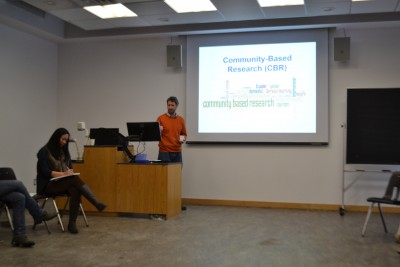by Nadine Changfoot, Community Environmental Sustainability hub (Peterborough/Haliburton) Academic Co-lead, with Annette Pedlar, POST Research Assistant
On January 13, Trent University’s Masters of Sustainability Studies (MASS) Colloquium featured the work of local community leaders, students and faculty. This event was brought together by the Community Environmental Sustainability Hub (Ptbo/Halib) of the Community First: Impacts of Community Engagement (CFICE) project.

Nadine Changfoot, CFICE’s CES (Ptb/Hbtn) Academic Co-lead, presents at the Trent University MASS program Colloquium (January 2016). ©Annette Pedlar
Nadine Changfoot, Chair of the Political Studies Department and MASS faculty, hosted the event as the Trent Academic Co-lead of CFICE Phase I (2012-2016). “Putting Community-First involves learning new ways of communicating and partnering among community and academy,” said Nadine.
John Marris, Executive Director, from the internationally recognized Trent Community Research Center (TCRC) and Community Co-lead of CFICE, discussed research opportunities available through the Centre. TCRC is a bridge organization connecting Trent and community, bringing together students and community organizations for community-based research.

John Marris, CFICE’s CES (Ptb/Hbtn) Community Co-lead, presents at the Trent University MASS program Colloquium (January 2016)
©Annette Pedlar
Sheila Ziman from the Haliburton Highland Land Trust presented her experiences working with faculty, undergraduate, and graduate students to maintain and restore ecosystems in Haliburton. “The outcomes are important,” said Sheila.
Next, Heather Reid, the Operations Director of Abbey Gardens, and Melissa Johnston, in second year of MASS, shared their experiences from Melissa’s summer working at Abbey Gardens. “My immersion in the community created an ease and depth of interaction. My ‘insider status’ helped to build trust and open doors,” said Melissa.
Tessa Nasca, also in the second year of MASS, outlined her experience with the Stewart Street Peterborough – Active Neighbourhoods Canada project that brings together the Stewart Street neighbourhood, community organizations, the City of Peterborough, and faculty to build capacity within the Stewart Street neighbourhood and the ability to strengthen community participation in planning processes. “High value comes from embedding oneself in the community,” said Tessa.
Finally, Prof. Stephen Hill from Environmental Resources Studies and MASS spoke of his experience as a faculty member who seeks partnerships outside of academic institutions. The day’s speakers represent only the start of the many rewarding partnerships possible when academia and the community partner together.

Listening to presentations at the Trent University MASS program Colloquium (January 2016). ©Annette Pedlar
Community-campus engagement opportunities like those featured at the Colloquium offer a platform for students to see local initiatives that build capacity for both community and Trent in Peterborough and the Kawarthas. Building upon the work of CFICE, the new MASS ‘Entrepreneurship and Innovation Management’ stream provides experiential learning and community-based action research opportunities for students in a full-time field placement in a community organization during Year 2 of the Program. “It aims to meet the growing need for professionals as a distinct group of skilled, entrepreneurial individuals with the knowledge, tools and practical expertise to address social and environmental challenges and opportunities in community based organizations,” said Asaf Zohar, Director of MASS.